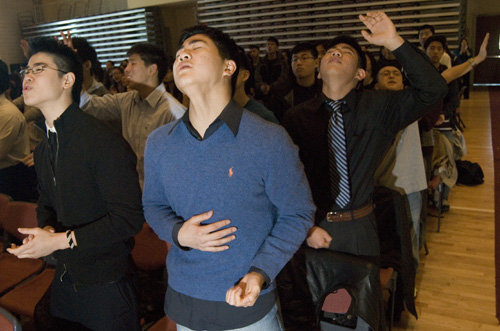One God, One Heritage
March 3, 2010 • By K. Swann
This meant we were not looking for ambitious, self-seeking people; rather, we were charged with finding people that were already humbly and lovingly striving to lower themselves into service for the gospel. This meant finding out where God was at work in the city and trying to be a part of it.
So, while most college representatives would spend the better part of their recruitment efforts twiddling their thumbs at college fairs in high school cafeterias, I would spend my days visiting churches in one of the most diverse boroughs known to New York City --Brooklyn.
The snapshot taken by the typical Spike Lee joint gives the masses a taste of this famed borough. But, take a church tour and you're bound to experience the full cross-section of what Brooklyn has to offer. The diversity amongst Brooklyn churches was striking for me and there was never a dull moment.
I spent time worshipping and working in French-speaking Haitian Churches in Brownsville, Spanish-speaking Pentecostal churches in Sunset Park, Russian-speaking church plants in Brighton Beach and a myriad of other church communities largely shaped by the culture of their surrounding communities. In all this, I learned something incredibly important about the relationship between gospel and heritage.
I must admit, I experienced some culture shock at first. I was a young Christian and these excursions always pushed me out of my comfort zone. I heard people speak in tongues for the first time. I nervously watched a woman get 'slain in the Spirit.' I listened to fire and brimstone sermons from pulpits in storefront churches that left me feeling guilty for having ever been born. These things do not happen at my church. Worst of all, I remember the real discomfort and unease that my presence brought into a fellowship that was otherwise absent of my 'demographic.' I occasionally made people uncomfortable. Whether it was the color of my skin or my naivete toward the cultural personality of their worship, I could seldom tell.

I struggled to reconcile the way these communities expressed their relationship with God with the personality of my own community. I guess I sometimes fell into thinking that my community's personality was God's personality. Fortunately, this ethnocentric thinking diminished with exposure until it was swallowed up in God-breathed, cross-cultural communion.
I spoke and preached in churches that looked and thought differently than I did, and the Spirit still moved. I saw liturgical dance for the first time and it propelled me into God's presence in a fresh and moving way. I shared in deep and genuine fellowship with people groups I knew nothing about. I was able to worship with sincerity and contrition in languages that I could not even speak. I learned I had no right to assume the superiority or accuracy of my community's experience and expression of God's presence over that of another. I came to appreciate the gospel in a new way as I realized it not only reconciles us to God, but it also reconciles humans to our deeper heritage.
Cultural differences abounded, languages divided, personality confused, but the heritage of the cross transcended all of these differences with its concrete singularity and its objective reality. All of these communities were birthed from the event of the crucifixion and resurrection of Jesus Christ. We found ourselves bonded together by our common need for God's saving grace. We found that we shared a single joy shaped by the severe mercy of God's loving sacrifice on the cross. We found ourselves sharing a thirst for the same Holy Spirit and we found that we all traced our origins back beyond our races or nationalistic badges into the very hands of our creative God.
 Take the risk of doing a church tour. Experience everything from low-church protestant services to highly liturgical worship services common in cathedrals. Visit a house church in Brooklyn or some of the Christian street fairs that celebrate Central American culture (seek and you shall find-they are quite loud). You may find that you have allowed your own insular experiences to limit your vision of God. It will help you to get a sense of just how big God is and it will ensure that his presence is what shapes the experiences you are having in your own community, not just social normalcy.
Take the risk of doing a church tour. Experience everything from low-church protestant services to highly liturgical worship services common in cathedrals. Visit a house church in Brooklyn or some of the Christian street fairs that celebrate Central American culture (seek and you shall find-they are quite loud). You may find that you have allowed your own insular experiences to limit your vision of God. It will help you to get a sense of just how big God is and it will ensure that his presence is what shapes the experiences you are having in your own community, not just social normalcy.We have inherited an amazing family through the cross. In Christ there is "neither Jew nor Greek, slave nor free, male and female." These lines that so easily divide humans have been drawn into the one blood line of the one Lord and savior. To misunderstand this is to misunderstand grace and the God from which it flows. Get out and celebrate our rich heritage with the extended family.
 K. Swann is a singer-songwriter in New York City with cutting edge thoughts on life, art and spirituality. He is currently studying Biblical Studies and Theology at Nyack College.
K. Swann is a singer-songwriter in New York City with cutting edge thoughts on life, art and spirituality. He is currently studying Biblical Studies and Theology at Nyack College.
Related Articles · More Articles

